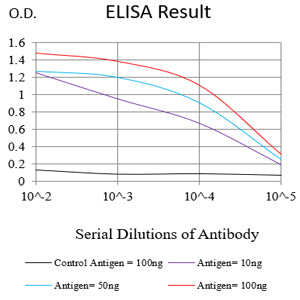
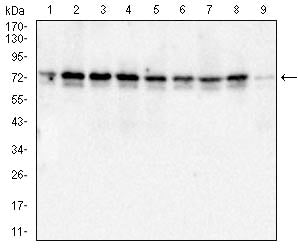
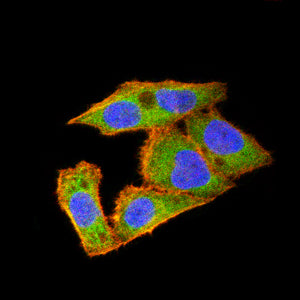
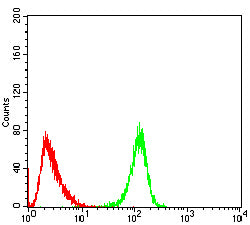
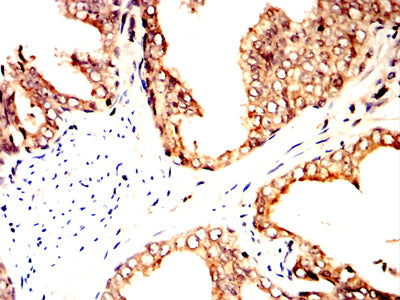
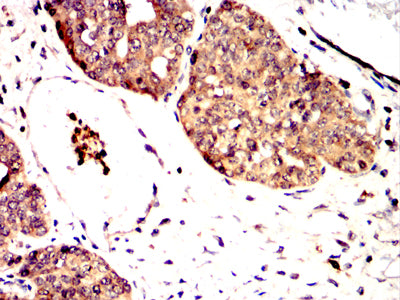
| WB | 1/500 - 1/2000 | Human, Monkey |
| IF | 咨询技术 | Human, Monkey |
| IHC | 1/200 - 1/1000 | Human, Monkey |
| ICC | 1/50 - 1/200 | Human, Monkey |
| FCM | 1/200 - 1/400 | Human, Monkey |
| Elisa | 1/10000 | Human, Monkey |
| Aliases | 3D3; AEG1; AEG-1; LYRIC; LYRIC/3D3 |
| Entrez GeneID | 92140 |
| clone | 1F3A3 |
| WB Predicted band size | 75KDa |
| Host/Isotype | Mouse IgG1 |
| Antibody Type | Primary antibody |
| Storage | Store at 4°C short term. Aliquot and store at -20°C long term. Avoid freeze/thaw cycles. |
| Species Reactivity | Human, Monkey |
| Immunogen | Purified recombinant fragment of human MTDH (AA: 200-450) expressed in mammalian. |
| Formulation | Purified antibody in PBS with 0.05% sodium azide |
+ +
以下是3篇关于MTDH(Metadherin/AEG-1)抗体的研究文献摘要,供参考:
---
1. **文献名称**:*The role of metadherin in oncogenesis and therapeutic targeting*
**作者**:Yujiang Shi, et al.
**摘要**:该研究探讨MTDH在多种癌症中的过表达机制,并利用特异性抗体(如兔源多克隆抗体)通过免疫组化和Western blot验证其与肿瘤转移、化疗耐药的相关性。研究发现MTDH抗体可用于靶向抑制肿瘤生长,提示其作为治疗靶点的潜力。
---
2. **文献名称**:*AEG-1/MTDH抗体在乳腺癌中的功能分析*
**作者**:Sarkar D, et al.
**摘要**:通过构建MTDH特异性单克隆抗体,研究团队在乳腺癌模型中证实MTDH通过激活NF-κB通路促进肿瘤侵袭。抗体阻断实验显示可显著降低癌细胞转移能力,为开发MTDH靶向疗法提供依据。
---
3. **文献名称**:*MTDH抗体在肝癌中的诊断与预后价值*
**作者**:Lee SG, et al.
**摘要**:该研究开发了一种高灵敏度MTDH兔单克隆抗体,用于肝癌组织芯片的免疫组化分析。结果显示MTDH高表达与患者生存率负相关,提示其作为肝癌诊断和预后标志物的临床价值。
---
**备注**:MTDH抗体的研究多集中于癌症机制与治疗领域,具体抗体信息需结合实验目的(如种属来源、应用场景)选择。建议通过PubMed或抗体供应商(如CST、Abcam)官网获取最新文献和产品说明书。
Metadherin (MTDH), also known as astrocyte elevated gene-1 (AEG-1) or LYRIC, is a transmembrane protein implicated in diverse cancer-related processes. First identified in 2002. MTDH gained attention due to its overexpression in multiple cancers, including breast, liver, prostate, and lung cancers. It plays a dual role as an oncoprotein and a metastasis promoter by regulating critical pathways such as NF-κB, PI3K/Akt, and Wnt/β-catenin signaling. MTDH enhances tumor cell proliferation, angiogenesis, invasion, and chemoresistance while suppressing apoptosis. Its lysine-rich C-terminal domain facilitates interactions with various binding partners, influencing gene expression and stress responses.
MTDH antibodies are essential tools for detecting protein expression levels in research and diagnostics. They enable investigations into MTDH's functional roles through techniques like Western blotting, immunohistochemistry, and immunofluorescence. Clinically, MTDH overexpression correlates with poor prognosis, making it a potential biomarker for cancer progression and therapeutic targeting. Recent studies explore MTDH's involvement in tumor microenvironment modulation and immune evasion, expanding its relevance in immunotherapy research. However, challenges remain in fully elucidating its structure-function relationships and isoform-specific activities, driving ongoing antibody development for improved specificity in experimental and clinical applications.
×